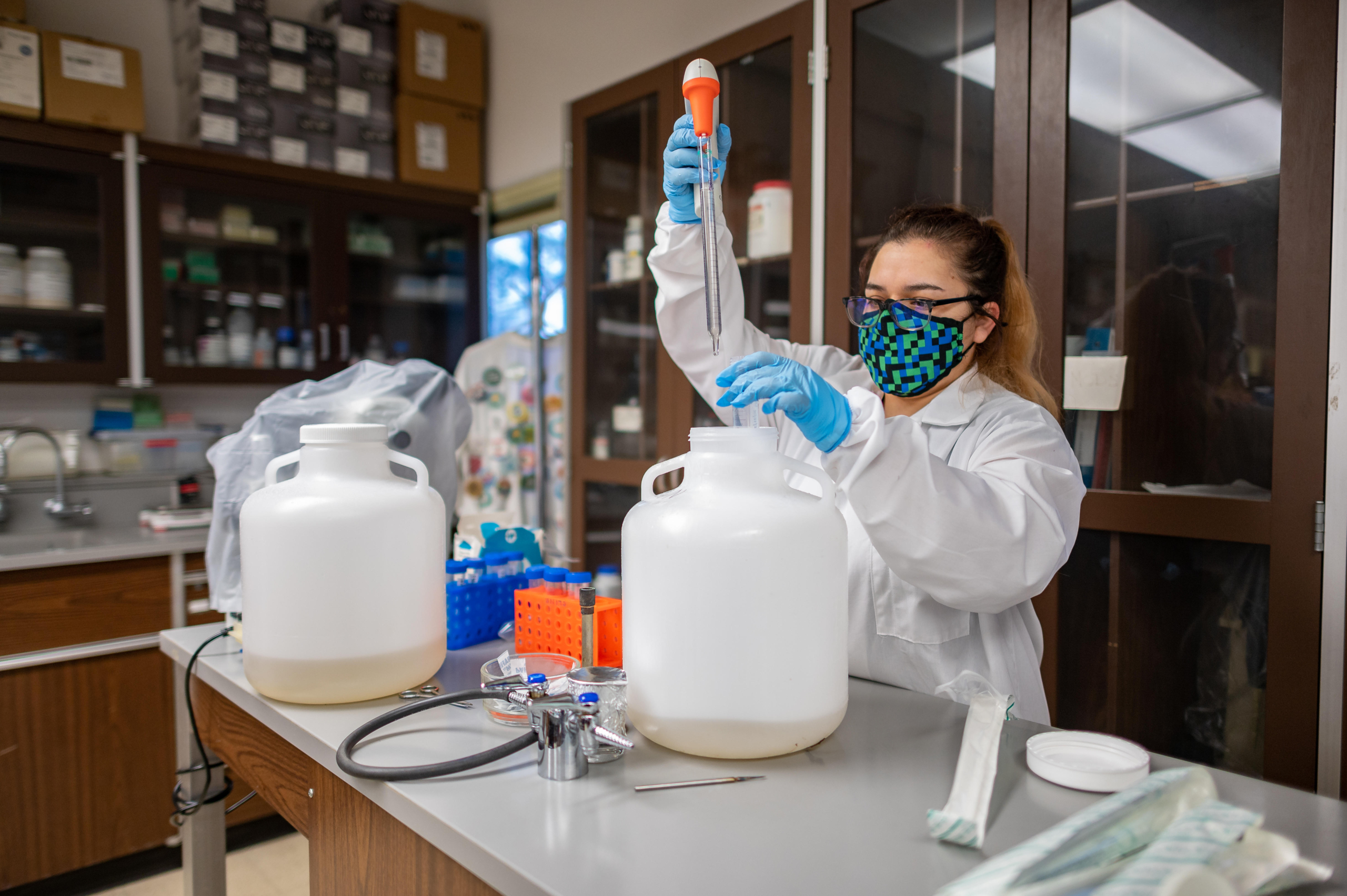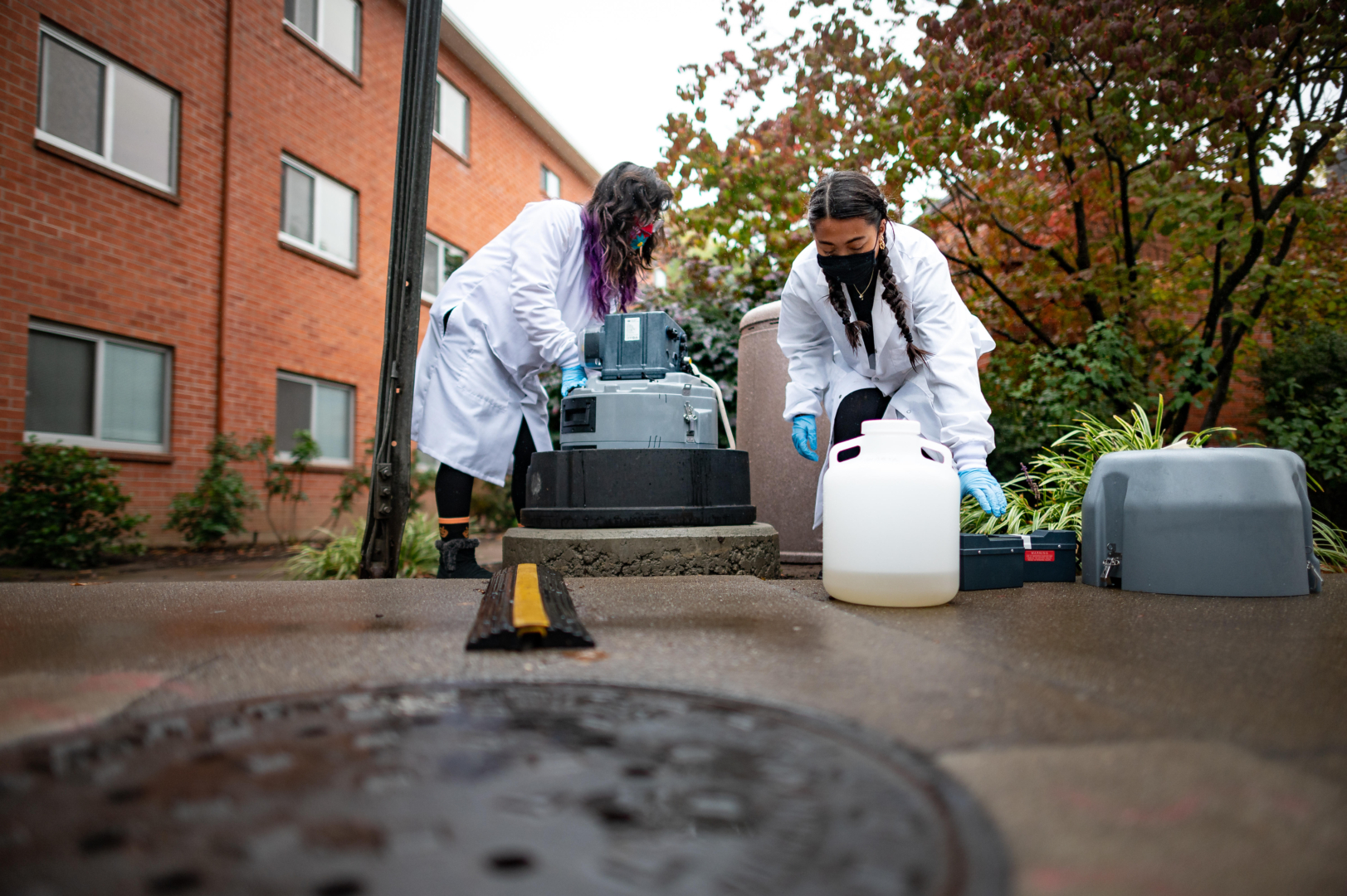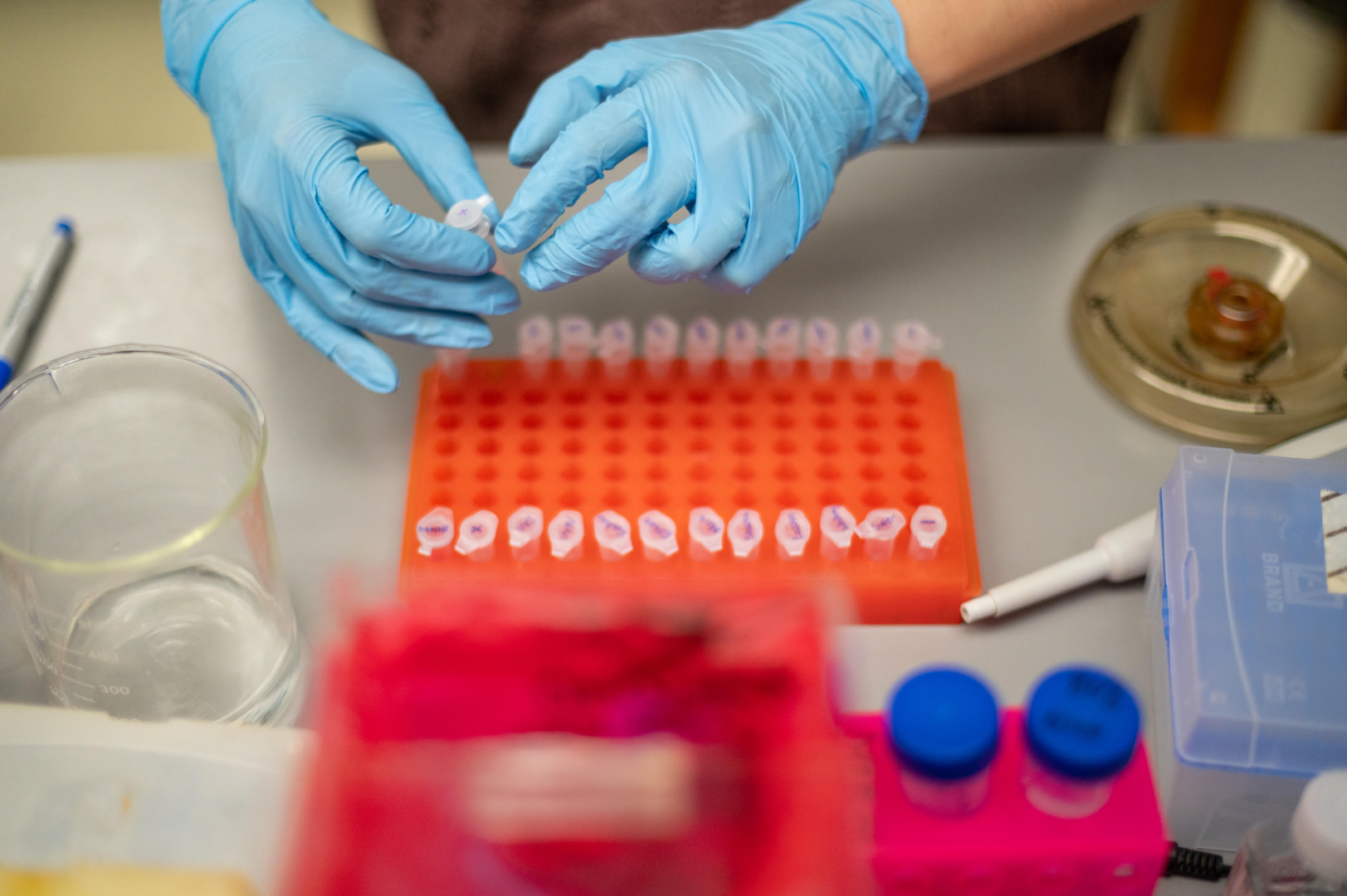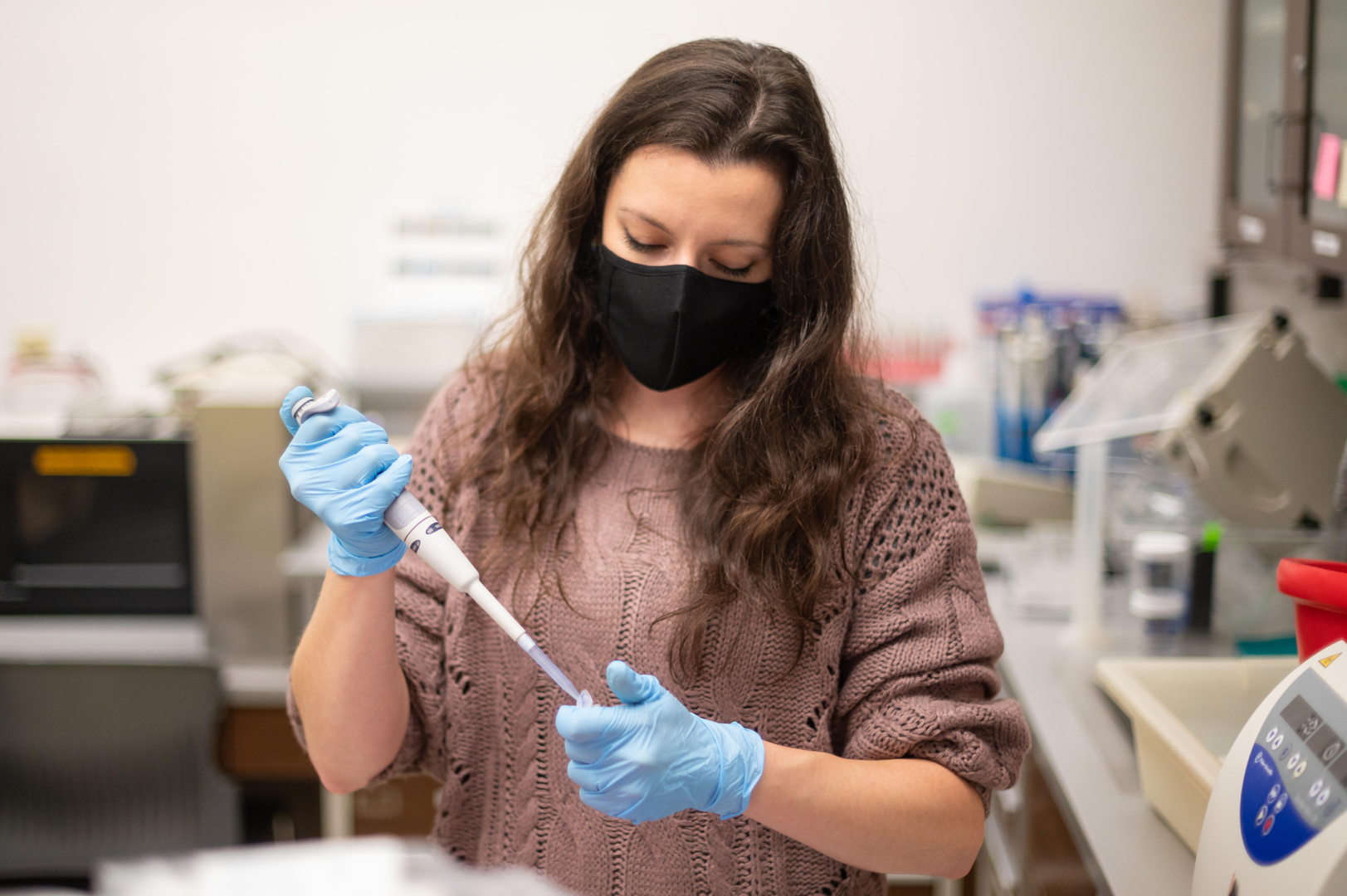Poop Sleuths: Student Researchers Track COVID-19 in Residence Halls

Elena Macias takes samples of the wastewater collections from the residence halls to check for Coronavirus (COVID-19) germs to monitor for a potential outbreak on Thursday, October 21, 2021 in Chico, Calif. (Jason Halley/University Photographer/Chico State)
They call themselves the “COVID sniffers.”
Twice a week, a student research team dons lab coats and rubber gloves, gathers a set of collection jugs, and traverses campus to tap into the residence halls’ wastewater system. With a sample from each hall, they return to their Holt Hall lab, pipette small volumes of wastewater into vials, and process them through a PCR machine to exponentially amplify viral RNA to detectable amounts—all in the name of student health and research.
“At the start of the pandemic, I felt weird sitting on the sidelines, especially because I want to go into microbiology. This is a way I can help, it’s a way I can do something,” said junior Elena Macias, a microbiology major.
The project monitors levels of RNA from SARS-CoV-2, the virus that causes COVID-19, in the residence halls. With the potential to identify a spike in cases days before students even realize they are sick, the testing allows the University to put additional safety measures in place to mitigate spread and creates an incredible research opportunity to learn more about how viruses work, said biological sciences professor and virologist Troy Cline.
Early in the pandemic, he heard about other universities and municipalities engaging in wastewater testing for COVID-19 but wasn’t sure it was feasible with Chico State’s budget. However, with support from the University’s Higher Education Emergency Relief Fund allocation, he was able to pull the project together alongside biological sciences professor Gerald Cobián. They were confident the project would be eagerly embraced by students and have long-term benefits for their discipline.

“Right now, we are all burned out in some ways with the pandemic and restrictions and changes to our lives, but we are taking advantage of an interest that is beginning to form for a lot of people,” said Cline. “We can funnel students into virology and public health so we have a well-trained crop of individuals with a passion for viruses and how to prevent pandemics and live safely with these viruses.”
Cline and Cobián began establishing lab protocol, identifying equipment needs, and planning infrastructure requirements. After several months, the surveillance testing was ready to launch for fall 2021.
Since September, two graduate students and six undergraduates have carried out twice-weekly collection and RNA extraction as paid interns. They note the job can be pungent at times, but they try to disassociate the “ick factor” with the seriousness and importance of the monitoring.
“I can see how science works, and how much we can do,” said Macias. “It’s not sexy but it’s important. There are all these things people can detect by looking through fecal matter. It’s fascinating.”
Senior Tawny Bolinas, a cellular and molecular biology major, said when she transferred to Chico State in 2020, she was disappointed to miss out on laboratory experiences due to pandemic-induced virtual learning. Now, she spends her days studying RNA extraction and testing protocols, and she feels like she’s become an expert in pipetting and preventing sample contamination.

One of her favorite aspects is the project team is comprised of nearly all women and people of color—who typically have been underrepresented in STEM.
“It’s nice to be part of this once-in-a-lifetime project,” Bolinas said.
Macias agrees. As someone who never expected to be so involved in research as an undergraduate, the project has enriched her understanding of microbiology and added a new perspective to the classes she is taking, she said. As she pipetted wastewater into vials, she paused to reflect on how surreal the project feels at times.
“It’s a global pandemic, and we are still in the middle of it,” she said. “At least I feel like I am doing the most that I can, beyond getting vaccinated. It’s a win-win—helping my career and helping other people.”
In recent months, the team has detected very few spikes—likely thanks to high vaccination rates and therefore low positivity rates within the halls. Biological sciences graduate researcher Molly Tuttle (Microbiology, ’17) admits she is torn by her desire to see the presence of COVID-19 in their samples. From a research perspective, positive cases identify trends and produce hypotheses but on a human level, it means her student peers inevitably have the virus and could be in varying stages of sickness.
“I realize these students are not just data points,” she said. “But I like the preparedness aspect. All of this is going to be relative to the next pandemic. The more we know and can learn about how the virus behaves and moves could be incredibly useful in mitigating the effects on a community.”

After the collection, graduate researcher Molly Tuttle adds a chemical preservative to each sample to stabilize the viral RNA for the duration of the extraction procedure. After a few more steps, the viral RNA—if present—is extracted and ready for PCR. With a steady hand, Tuttle gently mixes the various chemical components of the reverse transcription PCR reaction, which will convert the viral RNA into a complementary DNA copy and then amplify that DNA to detectable levels through multiple rounds of replication.
From other research, it appears wastewater surveillance makes it possible to detect cases three to four days before people are symptomatic or a nasal swab would test positive. Cline, who worked as a postdoctoral researcher during the H1N1 swine flu pandemic, said he hopes Chico State’s project will add to scientific knowledge about viruses and pandemics. Wastewater surveillance for viral pathogens had previously been done for intestinal viruses, but COVID-19 has made it clear that there are other applications, he said.
One question it could answer is if certain volumes of RNA in wastewater can make a data-driven prediction about how many potential infections it represents. Meanwhile, the project serves as an incredible learning opportunity for Chico State students. In addition to basic lab skills, the experience with RNA extraction and RT-PCR techniques will come in handy as they pursue scientific careers and make them leading candidates for a multitude of job and internship opportunities, Cline said.
“These are techniques that will come in handy for them regardless of what discipline of science they go into,” he said.


